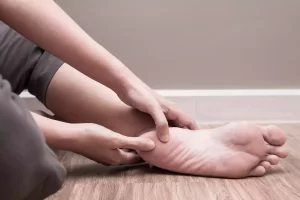Many athletes, especially recreational ones, get caught in a spiral of increasing the difficulty of training, even though they feel inside that this does not bring them the expected progress and often leads them away from it due to injuries, colds, digestive problems, or unwanted behavior.
While treating chronic pain and conditions, I often encounter the ultimately painful consequences of overdoing it in sports. After a certain period of cooperation with the athlete, a pattern of strongly repressed sensations always appears, which the person wants to keep in oblivion or the subconscious at all costs. In the article, I describe the understanding of these conditions according to the AEQ method and my own experience working with clients.
Problems due to excessive escalation of training arise when distorted or repressed sensations in the body want to have an appropriate influence on the person’s awareness, as this would enable them to learn and be aware of the difference between the present moment and the role they have now. Simultaneously, the person in the past was forced, taught, or encouraged not to recognize their real relationships, to distort or suppress them so that their response would be different from what they felt. This can only be achieved by a change in muscle tone and breathing that sufficiently alters the sensory-motor loop between the skeletal muscles and the conscious part of the nervous system.
This creates an internal opposition and separation between consciousness and the body, which requires and leads to a misunderstanding of sensations from the body and develops a hostile attitude towards oneself, and simultaneously leads to a state of chronic muscle contraction, making one unable to breathe or move probably, both of which is required for strong and clear expression which is necessary for efficient relationship changes.
This is why the imbalance in which they live gradually increases, which triggers ever stronger sensations in the body due to the demand to change behavior and life, but the subconscious blocks them because it wants to keep the tradition of relationships, even if they are not in our favor, mostly because the subconscious tries to help us survive and not live. This pattern is especially strong in us Slovenians since we were always threatened throughout history and had to find ways to survive. Freedom, determination, and tradition weren’t necessary for survival back then.
The inability to change, despite a clear physical signal of the unsustainability of this state and a strong fear of the actions that change requires, leads to the preservation and strengthening of blockages in the body and, at the same time, reinforces the need to redirect the energy intended for us for radical changes into a different behavior that it consumes energy but does not achieve radical changes. I emphasize the fact that radical changes require an appropriate amount of time and attention, so it is logical that a person who fears these changes or subconsciously resists them forces himself into actions and behaviors that take his time and energy because, this way, he can prevent changes without having feelings of helplessness, fear or guilt. However, this does not change the fact that there is more and more accumulated energy in the body, which must therefore be expressed through more and more work or sports, which leads to a dependent relationship. Addiction is a behavior in which one finds temporary satisfaction or release of tension that negatively affects one’s life in the long term, and one cannot give up this behavior despite being aware of the long-term negative effects.
Increasingly difficult exercises, therefore, have all the characteristics of addiction, which in my experience, leads to a taught or acquired inability to regulate relationships that harm us and lead us to deny deep feelings that we should naturally respond to as an adult and mature person, but due to subconscious patterns, we assume the role of a helpless victim. And just like in football, the rule is that a team gets a goal if they don’t score one, the rule in life is that a person has to create and acquire imbalances in himself if he doesn’t fix the imbalances in his relationships with those around him. The longer this state lasts, the more chronic problems and injuries occur, which sooner or later prevent exaggeration and thus confront the person with the real reasons for dissatisfaction, helplessness, and unwanted results of apparently good and healthy actions. But facing it can be so painful that it is less painful to go into a new series of exaggeration, fatigue, and redirection of internal tension from real frictions, conflicts, and unpleasant relationships, despite increasingly strong signals from the body.
The path that I teach in chronic conditions related to exaggeration is aimed at a sufficiently deep understanding of the described connections and acceptance of the facts that in the past of a person who had such a destructive attitude towards himself, many things were not as they think they were, and are so they had to transfer many things from awareness to the body. Therefore, they cannot relax, and they develop a fear of this state because it prevents them from being separated from themselves. The more they understand this, the more they can relax and thus let go of the states they have had inside them for many years. They dare to feel true well-being and begin to accept the sensations from their body, allowing themselves to be who they are without condemning and hating themselves. That way, the need to destroy and create states of burnout and chronic fatigue is weaker and can be more successfully renounced and create the necessary time and attention to understand and act on the environment by creating the necessary homeostasis in it and in oneself.
That way, they don’t fight with their emotions because they are already in them; they accept them and thus accept themselves. This way, they can indulge themselves because they can trust themselves more, and naturally, they would never harm themselves. When they accept themselves, they become pleased and don’t feel the need to judge themselves and others, except if there exists a real reason to do so in the present. Because they trust what they feel inside, they can act holistically and integrate into the environment in a way that will arrange what is disordered and is forcing them not to be well.






